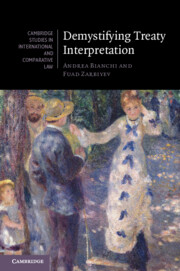Book contents
- Demystifying Treaty Interpretation
- Cambridge Studies in International and Comparative Law: 188
- Demystifying Treaty Interpretation
- Copyright page
- Contents
- Figures
- Preface
- Abbreviations
- 1 The Province of the Rules of Treaty Interpretation
- 2 The Interpreter’s Self
- 3 The Genealogy of the Contemporary Regime of Treaty Interpretation
- 4 Textualism
- 5 Intentionalism
- 6 What’s the Purpose of ‘Object and Purpose’?
- 7 Supplementary Means
- 8 The Magic of Systemic Integration
- 9 Inferential Reasoning and Its Consequences
- 10 Time and Treaty Interpretation
- 11 Text, Author, and Interpretive Control
- 12 Power, Persuasion, and Authority
- Annex Vienna Convention on the Law of Treaties 1969
- Index
- Cambridge Studies in International and Comparative Law
9 - Inferential Reasoning and Its Consequences
Published online by Cambridge University Press: 07 March 2024
- Demystifying Treaty Interpretation
- Cambridge Studies in International and Comparative Law: 188
- Demystifying Treaty Interpretation
- Copyright page
- Contents
- Figures
- Preface
- Abbreviations
- 1 The Province of the Rules of Treaty Interpretation
- 2 The Interpreter’s Self
- 3 The Genealogy of the Contemporary Regime of Treaty Interpretation
- 4 Textualism
- 5 Intentionalism
- 6 What’s the Purpose of ‘Object and Purpose’?
- 7 Supplementary Means
- 8 The Magic of Systemic Integration
- 9 Inferential Reasoning and Its Consequences
- 10 Time and Treaty Interpretation
- 11 Text, Author, and Interpretive Control
- 12 Power, Persuasion, and Authority
- Annex Vienna Convention on the Law of Treaties 1969
- Index
- Cambridge Studies in International and Comparative Law
Summary
Implying rights and obligations that are not explicitly set forth in a treaty is not a technique of treaty interpretation explicitly recognized in the Vienna Convention. But the practice of treaty interpretation supplies numerous examples of interpretively implied consequences of express treaty commitments. This chapter focuses on some of the best-known examples of treaty interpretation based on necessary implications ranging from the theory of implied powers of international organizations to the doctrine of positive obligations in international human rights law. Building on philosopher Robert Brandom’s theory of inferentialism, it argues that what is presented as necessary implications in treaty interpretation are discursively articulated inferential consequences of formal commitments undertaken under the treaty.
Keywords
- Type
- Chapter
- Information
- Demystifying Treaty Interpretation , pp. 185 - 198Publisher: Cambridge University PressPrint publication year: 2024

